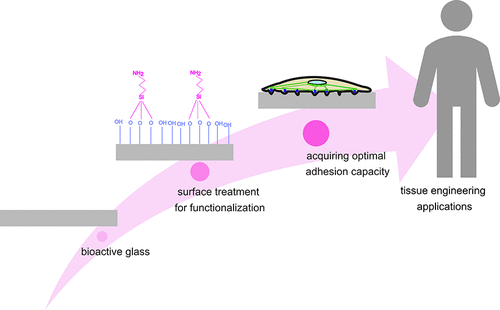Our official English website, www.x-mol.net, welcomes your
feedback! (Note: you will need to create a separate account there.)
Surface Modification of Bioactive Glass Promotes Cell Attachment and Spreading
ACS Omega ( IF 3.7 ) Pub Date : 2021-08-25 , DOI: 10.1021/acsomega.1c02669 Latifeh Azizi 1 , Paula Turkki 1, 2 , Ngoc Huynh 3 , Jonathan M Massera 3 , Vesa P Hytönen 1, 2
ACS Omega ( IF 3.7 ) Pub Date : 2021-08-25 , DOI: 10.1021/acsomega.1c02669 Latifeh Azizi 1 , Paula Turkki 1, 2 , Ngoc Huynh 3 , Jonathan M Massera 3 , Vesa P Hytönen 1, 2
Affiliation

|
Phosphate glasses have several advantages over traditional silicate-based bioglasses but are inferior in the crucial step of cell attachment to their surface. Here, as a proof of concept, we analyze fibroblast attachment to the phosphate glass surface subjected to basic treatment and silanization. Silicate (S53P4)- and phosphate (Sr50)-based bioactive glasses were either untreated or surface-treated with basic buffer and functionalized with silane. The surface-treated samples were studied as such and after fibronectin was adsorbed on to their surface. With both glass types, surface treatment enhanced fibroblast adhesion and spreading in comparison to the untreated glass. The surface-treated Sr50 glass allowed for cell adhesion, proliferation, and spreading to a similar extent as seen with S53P4 and borosilicate control glasses. Here, we show that surface treatment of bioactive glass can be used to attract cell adhesion factors found in the serum and promote cell–material adhesion, both important for efficient tissue integration.
中文翻译:

生物活性玻璃的表面改性促进细胞附着和扩散
磷酸盐玻璃与传统的基于硅酸盐的生物玻璃相比有几个优点,但在细胞附着于其表面的关键步骤中较差。在这里,作为概念的证明,我们分析了成纤维细胞附着在经过基本处理和硅烷化的磷酸盐玻璃表面上。基于硅酸盐 (S53P4) 和磷酸盐 (Sr50) 的生物活性玻璃要么未经处理,要么用碱性缓冲液进行表面处理,并用硅烷进行功能化。对表面处理过的样品进行研究,并在纤连蛋白吸附到其表面后进行研究。与未处理的玻璃相比,两种玻璃类型的表面处理都增强了成纤维细胞的粘附和扩散。表面处理过的 Sr50 玻璃允许细胞粘附、增殖和扩散到与 S53P4 和硼硅酸盐对照玻璃相似的程度。这里,
更新日期:2021-09-07
中文翻译:

生物活性玻璃的表面改性促进细胞附着和扩散
磷酸盐玻璃与传统的基于硅酸盐的生物玻璃相比有几个优点,但在细胞附着于其表面的关键步骤中较差。在这里,作为概念的证明,我们分析了成纤维细胞附着在经过基本处理和硅烷化的磷酸盐玻璃表面上。基于硅酸盐 (S53P4) 和磷酸盐 (Sr50) 的生物活性玻璃要么未经处理,要么用碱性缓冲液进行表面处理,并用硅烷进行功能化。对表面处理过的样品进行研究,并在纤连蛋白吸附到其表面后进行研究。与未处理的玻璃相比,两种玻璃类型的表面处理都增强了成纤维细胞的粘附和扩散。表面处理过的 Sr50 玻璃允许细胞粘附、增殖和扩散到与 S53P4 和硼硅酸盐对照玻璃相似的程度。这里,































 京公网安备 11010802027423号
京公网安备 11010802027423号